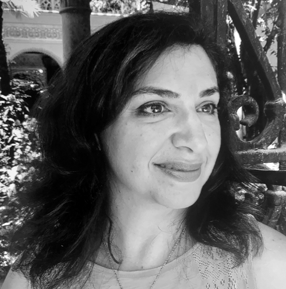In the late eighties, in the middle
of middle school we break from studying our ancestors,
pass on the Phoenicians for a while, leave the terraced fields
of Canaan and the hanging gardens of Babylon
for European History. Miss Magda
is our guide and she contextualizes
the continent, intertwines it with our own lives, the shapes
of our maps, the narrowing of our family names. She has
no patience for girls who are charmed by France,
even though a veil of Chanel No 5 unfurls
over our heads as she enters the room, nor for adults
who praise London’s museums. She narrates
a list of our possessions housed there. Miss Magda speaks
many languages: the queen’s English, impeccable
French, some Greek, maybe others? Her Arabic
an elegant Cairene, her eyeliner distinctly Cleopatran. She speaks
مش فارقة معها her mind, she names conquerors, and the servile
regimes they birthed. She liberates the word احتلال
from its quotidian presentation, locates our current colonizers
on a continuum of violence, sends us asking
our grandparents for stories. She enacts her name
as she towers over our desks and asks rhetorical questions
كثر خير العرب who translated Aristotle? Who filled
libraries
with books that would later make الرينيساس بتاعهم possible?
In the middle of middle school we are devotees
of American pop songs, they trickle into our lives
months after they top the charts, our childhoods are museums
housing the no-longer hits of the Reagan era. Miss Magda’s
class coincides with our Laura Branigan phase.
Miss Magda barely tolerates our tastes. When she cannot find
a way to escape playground duty and we are perfecting
our hair flips, passing the Walkman around and singing
“Gloria,” she raises a perfect eyebrow and turns toward us
and I think maybe even smiles. In class, ever the historian,
she remarks على فكرة that’s originally an Italian song.
و كانت مش بطالة بس خربوها الأمريكان
Credit
Copyright © 2018 by Lena Khalaf Tuffaha. Originally published in Poem-a-Day on September 11, 2018, by the Academy of American Poets.
About this Poem
“These days, I find I am more fascinated by the storytellers than the stories they tell. So many of the storytellers and teachers of my childhood were women, like Magda the glorious one. In many ways, these women were charged with preparing children for the future while rebuilding—through language and narrative—a past under threat of erasure. Most of this poem appears to be in English, but what lives inside of it? I write at the intersection of English with many other stories.”
—Lena Khalaf Tuffaha
Date Published
09/11/2018

